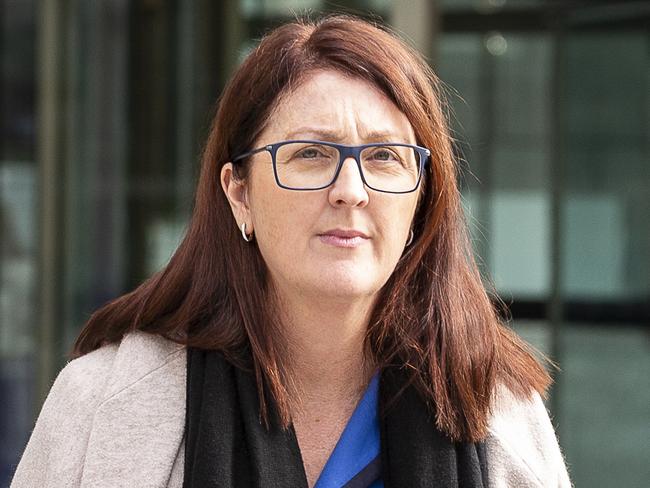Royal Commission: NAB open to possible criminal charges, regulator says
THE corporate cop says it’s concerned NAB breached the Corporations Act, leaving it open to possible criminal charges, according to confidential documents tabled in the finance royal commission today.
Business
Don't miss out on the headlines from Business. Followed categories will be added to My News.
THE corporate cop says it’s concerned NAB breached the Corporations Act — leaving it open to possible criminal charges — when it took money from customers but provided no service in return, confidential documents tabled at the royal commission show.
It also told the Melbourne lender it could have broken other parts of the Corporations Act when communicating with customers during the breach.
And heaping on the pain for the lender, it faces further possible prosecution over 84 breaches of its licence within ten days of them being detected.
MORE: DEAD PEOPLE CHARGED FEES BY NAB’S SUPER ARM
NAB EXEC DENIES LENDER LOOKED FOR WAYS TO AVOID PAYING CUSTOMERS BACK
Thus far the bank has had to pay back about $122 million over the issue in which it charged fees but did not offer service — but the scandal could be spreading.
The further charges are still with the regulator, the Australian Securities and Investments Commission, which is understood to still be weighing its options.
The revelations came to light after Royal Commissioner Ken Hayne this morning rejected National Australia Bank’s bid to keep its negotiations with the corporate cop over a huge fee scandal a secret.

Facing questioning over the 2017 document today, the former chair of NAB’s superannuation trustee Nulis, Nicole Smith said she did not know of the unfolding scandal until handed the document last year.
“Was this the first time you became aware that there had been two years of discussions between ASIC and NAB about a methodology to be used to determine whether there were further fees for no service breaches,” counsel assisting the commission Michael Hodge QC asked.
Ms Smith said: “(For) the two year period I would expect the answer to that is ‘yes’,” she told the commission. “(But) I was aware there had been ongoing discussions with the regulator,” she added.
Late yesterday, NAB’s legal counsel Neil Young QC fought against the airing of a document titled “outline of offending by the NAB group” which was an internal communication between the corporate cop and the lender.
Of the pages shown yesterday in the commission it showed the corporate cop had concerns about 40 complaints made against NAB on fee for no service.
Mr Young said NAB had not known the document was being produced and it would hinder ongoing talks between the regulator and the bank.
Mr Hayne this morning said he had to strike a balance between the need for a transparent public inquiry and the need for commercial privacy — but he fell on the side of public interest.
“It would be in the interests if NAB to pay the least sum available, it would be in the interests of the persons charged fees in circumstances where no service has been provided, to be provided with adequate compensation,” Mr Hayne said.
“It is in the public interest that there be an open and transparent inquiry,” he said.
SUPER FUND QUESTIONED OVER NEW DAILY DEAL
THE powerful bank regulator questioned why the nation’s biggest super fund helped bank roll The New Daily news website, the bank royal commission has heard.
The chief of Australia’s largest superannuation fund, Ian Silk, has taken the stand at the financial services royal commission to defend spending fees bank rolling the site.
Mr Silk revealed he spoke to the Australian Prudential and Regulatory Authority several times about the controversial move to help publish the news site using members fees.
APRA also sent a letter expressing its concerns.
Counsel assisting the commission, Michael Hodge QC, asked why it was in the interests of the fund to put out a publication that doesn’t focus on superannuation.
“We didn’t want to have a document that was overtly branded and just another publication from the superannuation fund. Sadly many of those (superannuation documents) find their way to the waste paper basket without being read,” Mr Silk said.

The $2m establishment cost from AustralianSuper to New Daily was made out of the $1.50 a week member fee covering things like marketing, rather than out of investment funds, Mr Silk said.
That AustralianSuper marketing fee is $78 a year per member.
Since The New Daily kicked off Mr Silk argued the overall $2m payment from AustralianSuper to The New Daily equated to 20 cents per annum per member.
Mr Silk said he could use the fees to push some political points.
“Absolutely we can use the fees — members fees to advocate for policies that we believe are to the benefit of the funds members,” he said.
“(The New Daily) was a new and innovative approach it was in our best judgment to that it was worth trying this.”
“We thought it was a worthwhile service.”
Mr Silk argued The New Daily was not a “thoughtless cheerleader” for industry funds.
The super chief said when The New Daily came back for more money, AustralianSuper said no.
“We were not convinced that it was operating as successfully as we would have hoped.”
Ultimately the Industry Super Holdings fund, which is owned by a number of industry funds one of which is AustralianSuper and CBUS, joined with The New Daily to take over the operations.
“ISH came back and said they would with New Daily … acquire it for zero consideration — that being the valuation — and would operate the new daily on an ongoing basis,” Mr Silk said.
Mr Silk said he understood The New Daily’s revenue came from advertising.
Mr Hodge asked if The New Daily was self funded. To which Mr Silk replied: “No, I believe it is not.”
The New Daily site is produced by Motion Publishing, with directors including former Herald Sun and The Age editor, Bruce Guthrie and digital publisher Eric Beecher.
“AustralianSuper is the largest shareholder in Industry Super Holdings, followed by CBUS, Hesta and Host-Plus. Industry Super Holdings owns various entities that provides services to the industry funds,” Mr Hodge said.
During this round of hearings, the commission is examining scandals in the super industry, which holds $2.6 trillion of Aussie retirement funds.
TIGERS PRESIDENT CAUGHT UP IN NAB SCANDAL
RICHMOND football club president Peggy O’Neal’s name has been dragged into the finance royal commission’s examination of NAB’s fee for no service scandal.
Ms O’Neal was mentioned as one of two people from NAB superannuation trustee Nulis who was to approve remediation to customers.
Ms O’Neal is a corporate lawyer who is a director of NAB subsidiary MLC nominees, and Nulis nominees.
MORE: DEAD PEOPLE CHARGED FEES BY NAB’S SUPER ARM
NAB EXEC DENIES LENDER LOOKED FOR WAYS TO AVOID PAYING CUSTOMERS BACK

Counsel assisting the commission Michael Hodge QC asked the former chair of its superannuation trustee Nulis, Nicole Smith, about paying back customers.
“The trustee delegated to two people on behalf of the trustee to make the decision to approve the proposal for remediation,” Mr Hodge asked. Ms Smith said “yes”.
“And those two people were you and Peggy O’Neal,” Mr Hodge said to which she replied “correct”.
A NAB document showed to the commission said: “As of 28 February/1 March 2018 board meeting it was resolved to delegate authority to Nicole Smith and Peggy O’Neal … to approve management’s recommended proposal to ASIC to resolve outstanding matters in respect to the Plan Service Fee.”
In the letter NAB says there is: “No admission of liability. Compensation to be paid on an ex-gracia basis rather than as a compensation for loss suffered as a result of a breach.”
“ASIC have acknowledged the letter and are considering the proposal.”
SUPER TRUSTEE SAT ‘ON SIDELINE’
This morning, Mr Hodges put it to Ms Smith that he was struggling to understand how the trustee, Nulis, met the duties of the act to be acting in the “best interest” of customers.
He said the trustee seemed to “sit on the sideline” when, in his words, NAB looked at ways to avoid paying out to customers.
“I don’t think the trustee was sitting on the sideline. I think the trustee was actively making sure it understood what was happening,” Ms Smith said.
The commission has been shown NAB actively looked for other ways to justify having charged the fees after it discovered it had charged general service fees without having an adviser attached to accounts.
NAB was looking at whether — after its failure to deliver the promised general advise — there had been a “fair exchange of value” by providing customers something else in dealings with the bank.

“ASIC disagrees with NAB’s view that it should test whether there was a customer adviser interaction, rather than whether NAB delivered on the express commitments it gave to customers,” ASIC says in a document.
In a letter last year ASIC also scolded NAB saying in a letter to the bank its approach to paying back customers was “out of step” with other lenders.
In another document it attacks NAB’s method for testing if customers got service.
Last year ASIC said NAB’s approach of waiting for customers to get back to them saying of they had not received a service was not good enough.
NAB wrote to customers asking if they got financial advice, if they did not get back to their bank NAB concluded there wasn’t enough evidence to say if they were in the wrong.
“We do not consider that the absence of a customer response can be taken to indicate that the required service was delivered,” ASIC said to NAB.
“NAB proposed that the absence of customer complaints could be construed as indicating the ongoing service was delivered.”
NAB CHARGED DEAD CUSTOMERS
Also yesterday, NAB superannuation services were revealed to have whacked fees on the accounts of more than 4000 dead customers, it has been revealed.
The finance Royal Commission yesterday heard a glitch led to accounts of customers paying for financial advice, even though they were dead.
It follows revelations in April that some financial advisers at the Commonwealth Bank charged dead clients fees — one for more than a decade.
It is believed 4135 deceased people may have been charged a total of $3 million by NAB. This equates to about $730 per account.
The former chair of NAB’s superannuation trustee Nulis, Nicole Smith, yesterday morning confirmed there had been instances of dead people being charged fees on their super accounts.
Ms Smith confirmed the cases were unearthed after NAB went through its books in May following the CBA revelations.
A remediation plan is currently being developed with cash going to the member’s estate.
The breach was reported to the bank regulator and the corporate cop on June 15 this year.


